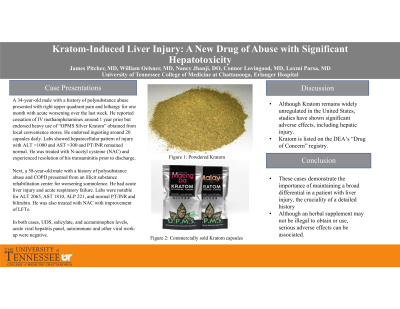Sunday Poster Session
Category: Liver
P1141 - Kratom-Induced Liver Injury: A New Drug of Abuse With Significant Hepatotoxicity
Sunday, October 22, 2023
3:30 PM - 7:00 PM PT
Location: Exhibit Hall

Has Audio

James Pitcher, MD
University of Tennessee HSC College of Medicine Chattanooga
Chattanooga, Tennessee
Presenting Author(s)
James Pitcher, MD, Nancy Jhanji, DO, Connor Lovingood, MD, William K. Oelsner, MD, Christopher Adams, DO, MS, BS, Laxmi Parsa, MD
University of Tennessee HSC College of Medicine Chattanooga, Chattanooga, TN
Introduction: Kratom is an herbal supplement derived from Mitragyn speciosas, a plant closely related to coffee found in Southeast Asia. In indigenous regions, Kratom is used for psychoactive effects as well as medicinal purposes. However, its psychoactive effects are primarily responsible for misuse worldwide.
Recent data detailing the supplement’s potential for dependence has led to its banning in several southeastern countries. Studies performed due to Kratom’s growing popularity have demonstrated significant toxicity. Data shows that the supplement’s most severe adverse effects were seizures, withdrawal, hallucinations, coma, and respiratory depression leading to arrest. This case series discusses 2 patients presenting with liver injury. Both were reportedly only taking Kratom supplementation, and other causes of liver injury were ruled out via extensive medical work-up.
Case Description/Methods: A 34 year old male with a history of polysubstance abuse presented with right upper quadrant pain and lethargy for one month with acute worsening over the last week. He reported cessation of IV methamphetamines around 1 year prior, but endorsed heavy use of “OPMS Silver Kratom” obtained from local convenience stores. He endorsed ingesting around 20 capsules daily. Labs showed hepatocellular pattern of injury with ALT >1000 and AST >300 while PT/INR remained normal. He was treated with N-acetyl cysteine (NAC) and experienced resolution of his transaminitis prior to discharge.
Next, a 58 year old male with a history of polysubstance abuse and COPD presented from an illicit substance rehabilitation center for worsening somnolence. He had liver injury and acute respiratory failure. Labs were notable for ALT 2065, AST 1810, ALP 221, and normal PT/INR and bilirubin. He was also treated with NAC with improvement of LFTs.
In both cases, UDS, salicylate and acetaminophen levels, acute viral hepatitis panel, autoimmune and other viral work-ups were negative.
Discussion: Although Kratom remains widely unregulated in the United, studies have shown significant adverse effects, including hepatic injury. This has led to the banning of the substance in some countries as well as being listed on the DEA’s “Drug of Concern” registry. These cases demonstrate the importance of maintaining a broad differential in a patient with liver injury, the cruciality of a detailed history, and understanding that, although an herbal supplement may not be illegal to obtain or use, serious adverse effects can be associated.
Disclosures:
James Pitcher, MD, Nancy Jhanji, DO, Connor Lovingood, MD, William K. Oelsner, MD, Christopher Adams, DO, MS, BS, Laxmi Parsa, MD. P1141 - Kratom-Induced Liver Injury: A New Drug of Abuse With Significant Hepatotoxicity, ACG 2023 Annual Scientific Meeting Abstracts. Vancouver, BC, Canada: American College of Gastroenterology.
University of Tennessee HSC College of Medicine Chattanooga, Chattanooga, TN
Introduction: Kratom is an herbal supplement derived from Mitragyn speciosas, a plant closely related to coffee found in Southeast Asia. In indigenous regions, Kratom is used for psychoactive effects as well as medicinal purposes. However, its psychoactive effects are primarily responsible for misuse worldwide.
Recent data detailing the supplement’s potential for dependence has led to its banning in several southeastern countries. Studies performed due to Kratom’s growing popularity have demonstrated significant toxicity. Data shows that the supplement’s most severe adverse effects were seizures, withdrawal, hallucinations, coma, and respiratory depression leading to arrest. This case series discusses 2 patients presenting with liver injury. Both were reportedly only taking Kratom supplementation, and other causes of liver injury were ruled out via extensive medical work-up.
Case Description/Methods: A 34 year old male with a history of polysubstance abuse presented with right upper quadrant pain and lethargy for one month with acute worsening over the last week. He reported cessation of IV methamphetamines around 1 year prior, but endorsed heavy use of “OPMS Silver Kratom” obtained from local convenience stores. He endorsed ingesting around 20 capsules daily. Labs showed hepatocellular pattern of injury with ALT >1000 and AST >300 while PT/INR remained normal. He was treated with N-acetyl cysteine (NAC) and experienced resolution of his transaminitis prior to discharge.
Next, a 58 year old male with a history of polysubstance abuse and COPD presented from an illicit substance rehabilitation center for worsening somnolence. He had liver injury and acute respiratory failure. Labs were notable for ALT 2065, AST 1810, ALP 221, and normal PT/INR and bilirubin. He was also treated with NAC with improvement of LFTs.
In both cases, UDS, salicylate and acetaminophen levels, acute viral hepatitis panel, autoimmune and other viral work-ups were negative.
Discussion: Although Kratom remains widely unregulated in the United, studies have shown significant adverse effects, including hepatic injury. This has led to the banning of the substance in some countries as well as being listed on the DEA’s “Drug of Concern” registry. These cases demonstrate the importance of maintaining a broad differential in a patient with liver injury, the cruciality of a detailed history, and understanding that, although an herbal supplement may not be illegal to obtain or use, serious adverse effects can be associated.
Disclosures:
James Pitcher indicated no relevant financial relationships.
Nancy Jhanji indicated no relevant financial relationships.
Connor Lovingood indicated no relevant financial relationships.
William Oelsner indicated no relevant financial relationships.
Christopher Adams indicated no relevant financial relationships.
Laxmi Parsa indicated no relevant financial relationships.
James Pitcher, MD, Nancy Jhanji, DO, Connor Lovingood, MD, William K. Oelsner, MD, Christopher Adams, DO, MS, BS, Laxmi Parsa, MD. P1141 - Kratom-Induced Liver Injury: A New Drug of Abuse With Significant Hepatotoxicity, ACG 2023 Annual Scientific Meeting Abstracts. Vancouver, BC, Canada: American College of Gastroenterology.
